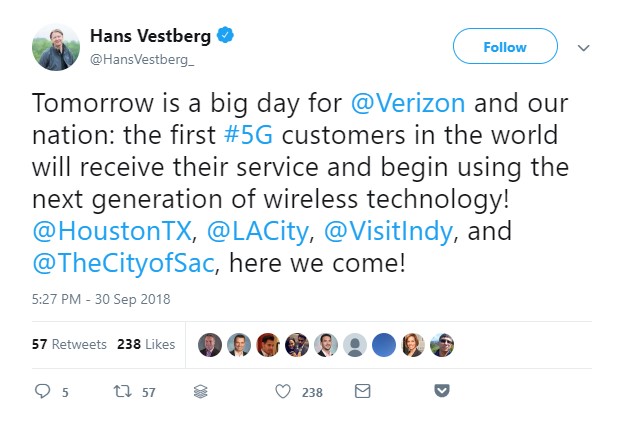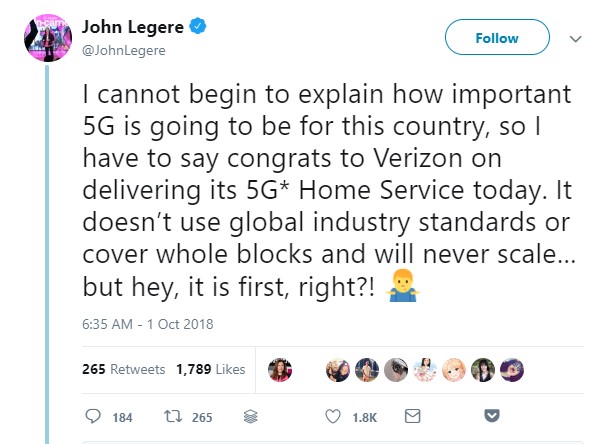On October 1, 2018, Verizon became the first U.S. provider to offer its Verizon 5G service to customers in four markets. Clayton and Emily Harris, residents of a single-family household in Houston, were the first to try it.
Offered to “First On 5G Members”
During this early rollout project, people who opt to get Verizon 5G are called “First On 5G Members.” These early adopters get exclusive perks, such as three months of the Home-level service at no charge, then a flat monthly rate after that.
People who are already Verizon subscribers with qualifying smartphone plans pay $50 per month, while non-Verizon customers get charged $20 more.
Moreover, these customers receive free equipment and professional installation, plus three free months of YouTube TV and a free Apple TV 4K or Google Chromecast Ultra device.
Analysts believe the 5G network could improve the quality of life for people around the world. Verizon 5G is a test case to investigate the truth of that possibility.
Lots of Excitement and Curiosity Expressed
The day before Verizon’s new offering arrived, the company’s CEO Hans Vestberg tweeted: “Tomorrow is a big day for Verizon and our nation…” Unfortunately, other tweets discussing the technology are mostly PR-based, making it impossible to know yet whether the service offers an adequate internet speed for the majority of users or otherwise meets customers’ expectations.
Some of the people involved with the installations in the respective cities posted pictures on Twitter of company trucks outside residents’ houses. When asked about his reason for signing up, Clayton Harris admitted, “I was tired of Comcast bill creep, and I wanted better speeds.” He said the service demonstrated a 1.3 gigabits per second speed after installation.
Naysayers Show Concerns
One potential problem about Verizon being the first company to offer this is it’s unclear whether the service might have unforeseen issues that make it not such a good buy after all.
As the 5G becomes more widely available, people will undoubtedly write reviews about it and weigh in about the good and bad aspects. But, that hasn’t happened yet.
It’s much easier to find people wondering “What will this mean for technology?” But, T-Mobile’s CEO John Legere did not hide his criticisms of Verizon’s service, tweeting: “…It doesn’t use global industry standards or cover whole blocks and will never scale…but hey, it is first, right?!” In subsequent tweets, Legere said the 5G network T-Mobile eventually offers would be nationwide.
Legere’s emphasis on downsides calls attention to the fact that Verizon is only using technologies that are a part of 5G but aren’t compatible with the future national network.
Indeed, Verizon is using a proprietary solution called 5G TF and will eventually need to upgrade to 5G NF at an unknown point in the future.
This approach was reportedly taken because the NF standard wasn’t progressing quickly enough and Verizon wanted to utilize available technologies. Michael Thelander, an analyst from Signals Research Group, recognized the potential worth of Verizon developing its own specifications. In recent field tests, he described the TF air interface as “very phenomenal” and said it offered the advertised speeds.
Last year, though, he clarified, “Hats off to them. But when you oversell it and call it 5G and talk about commercial services… it’s not 5G.” Not surprisingly, Howie Waterman, a media relations representative for Verizon asserted “This is true 5G!”
Will Verizon’s Service Threaten Google Fiber?
Many people know about Google Project Fi, which is Google’s move into the mobile network market. But, Google has another network project called Google Fiber.
It’s another home internet service that promises ultra-fast speeds — up to 1,000 MB per second. That’s not as fast as what Verizon offers now with its 5G service, but people can get Google Fiber in more cities.
There are reports, though, that Google is not focusing on the home broadband business as heavily as it once did. If Verizon ramps up its 5G service and Google scales back with its internet service, Google Fiber may not be a serious contender for people who want speedy home connections.
It shouldn’t be long before the public starts hearing about issues related to Verizon’s brand of 5G, assuming some exist. People who sign up for the service get access to a “24-hour concierge line” they can use to get technical questions answered.
Many Unknowns Still Exist
Because Verizon’s new network just arrived, it’s impossible to say with certainty whether it’s worth the money. It’ll be substantially more straightforward to make that determination once people start weighing in about things such as network stability, so people can see if other aspects of the network match the seemingly promising speed capabilities.
Recent Stories
Follow Us On
Get the latest tech stories and news in seconds!
Sign up for our newsletter below to receive updates about technology trends
















